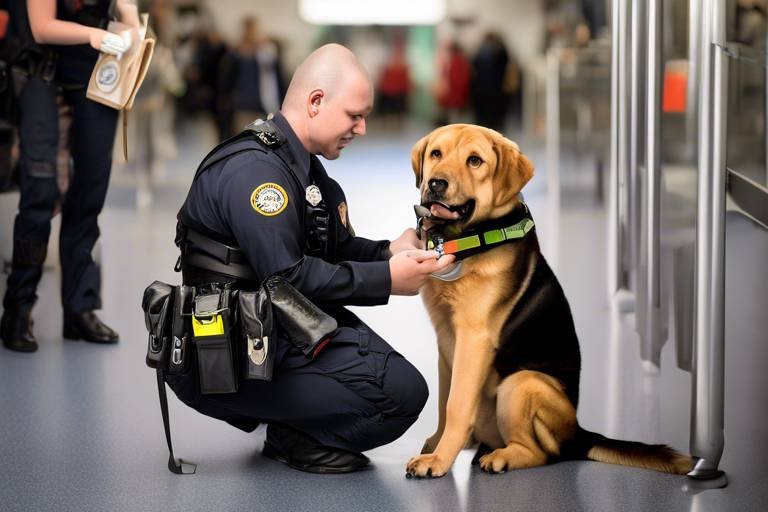Understanding the Benefits of Emotional Support Animals
In today's fast-paced world, where stress and anxiety often seem to lurk around every corner, the role of emotional support animals (ESAs) has become increasingly significant. These remarkable companions provide more than just furry cuddles; they offer a lifeline for individuals grappling with mental health challenges. Imagine coming home after a long, exhausting day, only to be greeted by a wagging tail or a soft purr. It's like a warm hug that melts away the day's worries. Emotional support animals serve as a vital part of therapeutic practices, enhancing emotional well-being and reducing feelings of loneliness and anxiety. They can transform a bleak day into one filled with hope and comfort, reminding us that we are never truly alone.
Emotional support animals are not just pets; they are companions specifically trained to provide comfort and support to individuals facing mental health issues. Their presence can significantly improve the quality of life for people dealing with conditions such as depression, anxiety, and PTSD. Think of them as a bridge to emotional stability. When you feel overwhelmed, having an ESA by your side can create a sense of security, making it easier to face daily challenges. This connection is not merely emotional; it has been shown through various studies that interacting with animals can lower cortisol levels (the stress hormone) and increase the production of serotonin and dopamine, which are neurotransmitters associated with happiness and well-being.
Understanding the legal rights of emotional support animals is crucial for both owners and landlords. Emotional support animals are protected under specific laws that ensure their owners can live freely without discrimination. The Fair Housing Act and the Air Carrier Access Act are two key pieces of legislation that provide important protections for ESAs. These laws help to create a more inclusive environment for individuals who rely on their animals for emotional support.
The Fair Housing Act is a significant piece of legislation that protects individuals with emotional support animals from housing discrimination. This act ensures that individuals can live in housing without being turned away due to their need for an ESA. Landlords are required to make reasonable accommodations for tenants with emotional support animals, which means they cannot impose pet fees or breed restrictions that would typically apply to regular pets. This protection is vital, as it allows individuals to find safe and stable housing while still having their emotional support animal by their side.
Traveling with an emotional support animal can be a daunting task, but the Air Carrier Access Act allows individuals to bring their ESAs on airplanes. This act outlines the necessary documentation and regulations that must be followed for air travel. Typically, airlines require a letter from a licensed mental health professional confirming the need for the ESA. This ensures that both the passenger and the airline are informed about the animal's role in providing emotional support, making the travel experience smoother and less stressful.
It's important to note that state laws regarding emotional support animals can vary significantly. Some states have additional protections or specific registration requirements for ESAs. For instance, in certain states, there may be more stringent documentation needed to qualify for an emotional support animal, while others may offer broader definitions of what constitutes an ESA. Understanding these differences is crucial for owners to ensure they are compliant with local regulations and can fully enjoy the benefits that their emotional support animals provide.
While dogs are the most common emotional support animals, a variety of other species can also fulfill this role. Cats, rabbits, and even miniature horses have been known to provide emotional support. Each type of animal brings its unique qualities that can help improve emotional well-being. For example, cats can be incredibly soothing with their gentle purring, while rabbits can offer a playful distraction from stress. The key is finding the right animal that resonates with the individual's emotional needs.
The benefits of emotional support animals extend far beyond companionship. These animals can have profound effects on mental health, helping to reduce symptoms of anxiety, depression, and PTSD. Studies show that the presence of an ESA can enhance overall emotional stability and resilience. They encourage routines, promote physical activity, and provide unconditional love, all of which are essential for maintaining mental health. Just as a lighthouse guides a ship safely to shore, emotional support animals can guide individuals through the turbulent waters of their emotional struggles.
One of the most significant benefits of having an emotional support animal is their ability to reduce anxiety and stress levels. The simple act of petting an animal can trigger the release of oxytocin, a hormone that promotes bonding and reduces stress. This calming effect can help individuals navigate daily challenges with greater ease. Imagine walking into a stressful situation, only to have your furry friend by your side, providing a sense of calm that makes everything feel a little more manageable.
Emotional support animals can also facilitate social interactions, breaking down barriers for individuals who struggle with social anxiety. They can act as a social catalyst, helping their owners connect with others in ways they might not have been able to do alone. For instance, walking a dog often leads to conversations with fellow dog owners, creating opportunities for social engagement. This interaction can improve social skills and build a sense of community, making individuals feel more connected and less isolated in their struggles.
- What qualifies an animal to be an emotional support animal? An emotional support animal is typically a pet that provides comfort and support to an individual with mental health issues. Unlike service animals, ESAs do not require specialized training.
- Do emotional support animals have the same rights as service animals? No, emotional support animals do not have the same legal rights as service animals. They are protected under different laws, primarily concerning housing and air travel.
- Can any animal be an emotional support animal? While dogs and cats are the most common, other animals like rabbits and miniature horses can also serve as emotional support animals, provided they meet the owner's needs.

The Role of Emotional Support Animals
Emotional support animals (ESAs) play a crucial role in the lives of individuals facing mental health challenges. Imagine coming home after a long, exhausting day, feeling weighed down by the world. Now, picture a furry friend greeting you at the door, tail wagging, ready to provide unconditional love and comfort. That’s the magic of an emotional support animal! They are more than just pets; they are companions that offer emotional stability and help individuals navigate through life's ups and downs.
These animals are often integral to therapeutic practices, serving as a bridge between the individual and their emotional well-being. Studies have shown that the presence of an ESA can lead to significant improvements in mental health. For instance, petting a dog or cuddling a cat can release oxytocin, a hormone that promotes bonding and reduces stress. This simple act can create a sense of calm and safety, allowing individuals to feel more grounded and less anxious.
Moreover, emotional support animals can help combat feelings of loneliness and isolation, which many people experience during tough times. The companionship they provide can be a lifeline for those struggling with conditions like depression or anxiety. With an ESA by their side, individuals often report feeling more connected to the world around them. It’s as if these animals have a sixth sense, knowing when their human needs a little extra support.
In addition to providing emotional comfort, ESAs can also encourage individuals to engage in daily activities. For example, a dog needs to be walked, which can motivate its owner to get outside, breathe fresh air, and interact with others. This not only benefits the owner’s mental health but also promotes physical activity, which is essential for overall well-being.
It's important to note that the role of emotional support animals extends beyond just companionship. They can also be trained to assist their owners in specific ways, such as alerting them to anxiety attacks or reminding them to take medications. This multifaceted support can be a game-changer for those dealing with mental health issues.
In conclusion, emotional support animals are invaluable allies in the journey toward better mental health. They provide comfort, promote social interaction, and encourage a more active lifestyle. Whether it’s a dog, cat, rabbit, or even a miniature horse, the bond formed with an ESA can be a source of strength, resilience, and love.
- What qualifies an animal to be an emotional support animal? Any animal can potentially qualify as an ESA as long as it provides comfort and support to its owner. However, they do not require specific training like service animals.
- Do emotional support animals have the same legal rights as service animals? No, ESAs have different legal protections compared to service animals. While they are protected under certain laws, they do not have the same access rights in public places.
- Can I take my emotional support animal on a plane? Yes, under the Air Carrier Access Act, individuals can travel with their ESAs, but specific documentation is often required.

Legal Protections for Emotional Support Animals
Understanding the legal rights of emotional support animals (ESAs) is crucial—not just for the owners, but also for landlords and service providers. These animals play a significant role in the lives of individuals who require emotional support, and various laws are designed to protect both the animals and their owners. Among the most important pieces of legislation are the Fair Housing Act and the Air Carrier Access Act. Each of these laws provides specific protections that ensure individuals with emotional support animals can live and travel without facing discrimination.
The Fair Housing Act is particularly important as it prohibits housing discrimination based on disability. This means that landlords cannot refuse to rent to tenants simply because they have an emotional support animal. Instead, they are required to make reasonable accommodations to allow these animals in their properties. For instance, if a tenant has a documented need for an ESA, the landlord must permit the animal, even if the property has a no-pets policy. It's essential for both tenants and landlords to understand what constitutes a reasonable accommodation, which can include allowing the animal to live in the unit or making adjustments to the housing environment to ensure the tenant's comfort.
On the other hand, the Air Carrier Access Act provides individuals with emotional support animals the right to travel with their animals on commercial flights. However, there are specific regulations and documentation requirements that must be adhered to. Airlines may require a letter from a licensed mental health professional that verifies the need for the ESA. This is crucial for ensuring that both the animal and the owner can travel together without facing undue hardship. Understanding these requirements can prevent last-minute travel hassles and ensure a smooth journey.
It's worth noting that laws can vary significantly from state to state when it comes to emotional support animals. Some states may have additional protections or specific registration requirements for ESAs. For example, a few states offer more extensive rights, allowing emotional support animals access to places beyond just housing and air travel. In contrast, others may have stricter regulations that could limit the types of animals that qualify or the documentation needed. Therefore, it's vital for ESA owners to familiarize themselves with their state laws to ensure they are fully protected.
Here’s a brief overview of some key legal protections:
| Law | Protection Offered |
|---|---|
| Fair Housing Act | Prohibits housing discrimination and mandates reasonable accommodations for ESAs. |
| Air Carrier Access Act | Allows ESAs to travel on commercial flights with proper documentation. |
| State-Specific Laws | Varies by state; may include additional protections or registration requirements. |
In conclusion, understanding the legal protections available for emotional support animals is essential for ensuring that both owners and their furry companions can navigate housing and travel without facing discrimination. By being informed about these laws, individuals can advocate for their rights and ensure a better quality of life for themselves and their emotional support animals.
- What qualifies as an emotional support animal? An emotional support animal is typically a pet that provides comfort and support to an individual with a mental health condition.
- Do I need a special certification for my emotional support animal? While there is no official certification required, a letter from a licensed mental health professional can be necessary for legal protections.
- Can my landlord refuse my emotional support animal? No, under the Fair Housing Act, landlords are required to make reasonable accommodations for emotional support animals.
- Are emotional support animals allowed on airplanes? Yes, the Air Carrier Access Act allows emotional support animals to travel on commercial flights with the appropriate documentation.
Fair Housing Act
The is a pivotal piece of legislation that plays a crucial role in ensuring that individuals with emotional support animals (ESAs) can access housing without facing discrimination. This act, which was enacted in 1968, aims to eliminate barriers that might prevent individuals from securing a place to live based on their disability status. For those relying on emotional support animals, understanding the nuances of this law is essential in advocating for their rights.
Under the Fair Housing Act, landlords and housing providers are required to make reasonable accommodations for tenants who have emotional support animals. This means that if a tenant has a documented need for an ESA due to a mental health condition, the landlord cannot refuse to allow the animal simply because it is not a traditional pet. It’s important to note that while the act protects the rights of tenants, it also imposes certain responsibilities on them. For instance, tenants must provide adequate documentation from a licensed mental health professional that outlines their need for the emotional support animal.
Furthermore, the Fair Housing Act prohibits housing discrimination based on several factors, including disability, race, color, religion, sex, familial status, and national origin. This comprehensive protection ensures that individuals with emotional support animals are treated fairly in the housing market. However, there are some exceptions; for example, the act does not cover housing operated by private clubs or religious organizations that limit occupancy to members.
To better understand the implications of the Fair Housing Act on emotional support animals, consider the following key points:
- Landlords cannot impose breed or size restrictions on emotional support animals.
- Tenants are responsible for any damages caused by their emotional support animal.
- Landlords can ask for documentation but cannot demand specific types of documentation that are not relevant to the ESA's role.
In summary, the Fair Housing Act is a critical ally for individuals who rely on emotional support animals. By fostering an environment of inclusivity and understanding, this law helps ensure that everyone has the right to live comfortably and without fear of discrimination. If you or someone you know is navigating housing issues related to an emotional support animal, it’s vital to be informed of these rights and protections to advocate effectively.
Air Carrier Access Act
The Air Carrier Access Act (ACAA) is a crucial piece of legislation that ensures individuals with emotional support animals (ESAs) can travel on airplanes without facing discrimination. This act is designed to provide essential protections for passengers who rely on their emotional support animals for comfort and companionship during flights. It's important to understand that while the ACAA offers significant benefits, it also comes with specific requirements that both passengers and airlines must adhere to.
To travel with an emotional support animal under the ACAA, individuals must provide certain documentation to the airline. This typically includes a letter from a licensed mental health professional that confirms the need for the emotional support animal. The letter should state that the individual has a mental health condition and that the animal provides necessary support. Additionally, airlines might require a completed Animal Behavior and Health Form, which ensures the animal is well-behaved and healthy enough to travel.
The ACAA mandates that airlines must allow passengers to travel with their emotional support animals in the cabin, provided they meet the necessary criteria. However, there are a few important points to keep in mind:
- Size and Weight Limitations: Airlines may have restrictions on the size and weight of the animal, so it's essential to check with the specific airline before booking your flight.
- Advance Notice: Passengers are generally required to notify the airline at least 48 hours prior to their flight if they plan to bring an emotional support animal.
- Behavioral Expectations: The animal must be well-behaved and not pose a threat to other passengers. If the animal exhibits aggressive behavior, the airline has the right to deny boarding.
It's worth noting that while the ACAA provides these protections, it does not cover all animals. Only specific types of animals are recognized as emotional support animals under this act. Typically, dogs are the most common, but some airlines may allow other species as well. Understanding these nuances can help prevent any last-minute surprises at the airport.
In conclusion, the Air Carrier Access Act plays a vital role in ensuring that individuals with emotional support animals can travel by air with the comfort and support they need. By being aware of the necessary documentation and requirements, passengers can enjoy a smoother travel experience with their beloved companions.
Below are some common questions regarding emotional support animals and air travel:
- Can any animal be an emotional support animal? No, only certain animals, typically dogs, are recognized as emotional support animals under the ACAA.
- Do I need to pay extra for my emotional support animal? Policies vary by airline, so it's essential to check with your specific airline regarding any fees associated with traveling with an ESA.
- What if my emotional support animal misbehaves during the flight? If your animal displays aggressive or disruptive behavior, the airline has the right to ask you to remove the animal from the flight.
State-Specific Laws
When it comes to emotional support animals (ESAs), it's essential to recognize that laws can vary significantly from state to state. This patchwork of regulations can create confusion for both ESA owners and landlords. For instance, some states may require specific documentation or registration for emotional support animals, while others may not have such requirements at all. This inconsistency can lead to misunderstandings and potential legal issues if not properly navigated.
In many states, emotional support animals are recognized under certain laws, but the level of protection they receive can differ. For example, while the Fair Housing Act provides broad protections for ESAs in housing situations, some states have additional laws that further clarify the rights of ESA owners. These laws may detail the types of animals that qualify as emotional support animals, as well as the responsibilities of landlords to accommodate them.
To help clarify this complex landscape, here are a few examples of how state laws can differ:
- California: In California, emotional support animals are protected under state law, and landlords must provide reasonable accommodations for tenants with ESAs. However, landlords may request documentation from a licensed mental health professional.
- New York: New York law also protects emotional support animals in housing situations, but the state has specific guidelines about the types of animals that can be considered ESAs.
- Texas: Texas requires that individuals with emotional support animals provide documentation, but the state does not have a formal registration process for ESAs.
It's crucial for ESA owners to familiarize themselves with their state's specific laws to ensure they are compliant and protected. Additionally, landlords should also be aware of these regulations to avoid potential legal disputes. Keeping abreast of state-specific laws can make a world of difference in ensuring a harmonious living situation for both parties.
1. What is the difference between an emotional support animal and a service animal?
Service animals are specifically trained to perform tasks for individuals with disabilities, while emotional support animals provide comfort and companionship but are not trained for specific tasks.
2. Do I need a special certification for my emotional support animal?
Generally, you do not need a special certification. However, some landlords may require documentation from a licensed mental health professional.
3. Can any animal be an emotional support animal?
While dogs and cats are the most common emotional support animals, other animals like rabbits, birds, and even miniature horses can qualify, depending on state laws.
4. What rights do I have as an emotional support animal owner?
As an ESA owner, you have the right to live with your animal in housing that does not typically allow pets, as long as you provide necessary documentation and meet your state's regulations.
Types of Animals as Emotional Support
When we think about emotional support animals, our minds often jump straight to dogs. After all, they are renowned for their loyalty and companionship. However, the world of emotional support goes far beyond just our furry friends. Various animals can fulfill this vital role, providing comfort and emotional stability to those in need. It's fascinating to consider how different species can connect with us on an emotional level, often in ways we might not expect. For instance, have you ever thought about how a soft, purring cat can soothe a troubled mind? Or how a fluffy rabbit can bring joy and laughter into a home? Each type of animal offers unique benefits that can enhance emotional well-being.
Let's take a closer look at some of the most common types of emotional support animals:
- Dogs: The classic choice for emotional support, dogs are known for their ability to sense human emotions and provide unconditional love.
- Cats: Often more independent, cats can still offer companionship and comfort, especially with their calming purrs.
- Rabbits: These gentle creatures can be incredibly affectionate and are known for their playful nature, making them great companions.
- Miniature Horses: Surprisingly, miniature horses can serve as emotional support animals. They are intelligent, social, and can be trained to provide comfort.
- Birds: Parrots and other birds can offer companionship and even mimic speech, providing a unique form of emotional interaction.
Each of these animals has its own way of connecting with humans, offering a unique form of support. For example, dogs often engage in physical activities that can help their owners stay active, while cats may encourage relaxation through their calming presence. It's essential to choose an emotional support animal that fits your lifestyle and needs. Remember, the bond you share with your animal is what truly makes them an effective emotional support companion. Whether it’s a wagging tail, a gentle nuzzle, or the soft sound of a purring cat, the emotional connection can be incredibly powerful.
Moreover, the choice of an emotional support animal can also depend on practical considerations such as living arrangements and personal preferences. Some people may find that a smaller animal, like a rabbit or a bird, fits better into their living space. Others may thrive with the companionship of a larger animal, like a dog or a miniature horse. The key takeaway is that emotional support can come in many forms, and the best choice is the one that resonates with you personally.
Here are some common questions regarding emotional support animals:
- Can any animal be an emotional support animal? While many animals can provide emotional support, they must be well-behaved and trained to assist their owners effectively.
- Do emotional support animals require special training? Unlike service animals, emotional support animals do not require formal training, but basic obedience training is beneficial.
- What documentation do I need for my emotional support animal? A letter from a licensed mental health professional is typically required to certify your animal as an emotional support companion.

Benefits for Mental Health
Emotional support animals (ESAs) are more than just adorable companions; they can play a transformative role in improving mental health. Imagine coming home after a long, stressful day, and being greeted by a furry friend who seems to sense your mood. Their unconditional love and presence can be a game-changer, especially for those grappling with anxiety, depression, or PTSD. The bond between humans and their ESAs is profound, often leading to a significant reduction in mental health symptoms and an overall boost in emotional well-being.
Research has shown that interacting with animals can trigger the release of oxytocin, a hormone associated with bonding and stress relief. This means that simply petting or cuddling an animal can help calm your mind and ease your worries. For many, the act of caring for an animal provides a sense of purpose and responsibility that can combat feelings of hopelessness. Furthermore, the companionship offered by ESAs helps to alleviate feelings of loneliness, creating a safety net of support for individuals navigating their mental health challenges.
Moreover, emotional support animals can significantly enhance social interactions. For individuals who struggle with social anxiety, having an ESA can serve as a bridge to the outside world. They can facilitate conversations and connections with others, making social situations less daunting. For instance, when walking a dog in the park, it’s not uncommon for owners to strike up conversations with fellow dog lovers. This simple act can lead to new friendships and a sense of community, which are essential for mental well-being. In essence, ESAs can help individuals break down barriers that often accompany mental health issues.
Additionally, the presence of an emotional support animal can contribute to a structured routine, which is particularly beneficial for those dealing with depression. Daily tasks such as feeding, walking, and grooming an ESA can instill a sense of normalcy and responsibility, motivating individuals to engage more fully in their lives. This routine not only provides a distraction from negative thoughts but also fosters a sense of accomplishment.
| Benefits of Emotional Support Animals | Impact on Mental Health |
|---|---|
| Reduces Anxiety | Calms the mind and lowers stress levels through companionship. |
| Alleviates Depression | Provides purpose and responsibility, combating feelings of hopelessness. |
| Enhances Social Skills | Encourages social interaction and connection with others. |
| Offers Comfort | Provides emotional support during difficult times, reducing feelings of loneliness. |
In conclusion, the benefits of emotional support animals extend far beyond mere companionship. They can profoundly impact mental health by providing comfort, enhancing social interactions, and instilling a sense of purpose. For those struggling with mental health challenges, the presence of an ESA can be a beacon of hope, guiding them toward a brighter, more fulfilling life.
1. What qualifies as an emotional support animal?
An emotional support animal is any animal that provides comfort and support to an individual suffering from mental health issues. Unlike service animals, ESAs do not require specialized training.
2. Do emotional support animals have legal protections?
Yes, emotional support animals are protected under laws such as the Fair Housing Act and the Air Carrier Access Act, which allow individuals with ESAs certain rights in housing and air travel.
3. Can any animal be an emotional support animal?
While dogs and cats are the most common, other animals like rabbits, birds, and even miniature horses can serve as emotional support animals, depending on the individual's needs.
4. How do I get an emotional support animal?
To obtain an ESA, you typically need a letter from a licensed mental health professional stating that you would benefit from the companionship of an animal.
5. Are there any restrictions on emotional support animals?
Yes, there may be restrictions based on housing policies or airline regulations, so it's important to be familiar with the specific rules that apply to your situation.
Reducing Anxiety and Stress
Feeling overwhelmed by anxiety and stress is something many people experience, and it can sometimes feel like a heavy weight on your shoulders. This is where emotional support animals (ESAs) come into play, offering a unique form of comfort that can help alleviate those burdens. Imagine coming home after a long, stressful day at work, and the moment you step through the door, you’re greeted by the wagging tail of your beloved dog. That simple act can spark joy and create a sense of calm that washes over you like a warm blanket. Emotional support animals are not just pets; they are companions that provide a profound sense of security and comfort, which can significantly reduce anxiety levels.
Research has shown that interacting with animals can trigger the release of oxytocin, a hormone associated with bonding and emotional connection. This process can lead to lower blood pressure, reduced heart rates, and an overall sense of peace. For many, spending time with their ESA is a form of therapy that doesn’t require a therapist’s office. Just petting a cat or playing fetch with a dog can be enough to distract from the chaos of daily life and provide a moment of tranquility. It’s like having a personal cheerleader who is always there to lift your spirits.
Moreover, emotional support animals can help individuals develop coping mechanisms to deal with anxiety. For instance, when someone feels anxious in social situations, having their ESA by their side can act as a safety net, providing reassurance and confidence. This can encourage individuals to engage more with their environment and face challenges head-on. In many ways, these animals serve as a bridge between the person and the world around them, making it easier to navigate through stressful situations.
Additionally, the routine of caring for an emotional support animal can also create a sense of purpose and responsibility. Feeding, walking, and playing with an ESA can help establish a daily routine, which is crucial for those struggling with anxiety. This structure can foster a sense of normalcy, breaking the cycle of negative thoughts that often accompany anxiety disorders. It’s like having a built-in schedule that not only keeps you active but also helps you focus on something positive.
In summary, emotional support animals play a critical role in reducing anxiety and stress. They provide comfort, promote social interaction, and help establish routines that contribute to emotional stability. If you’re considering an ESA, think about the unique bond you can create and how it might transform your life. Remember, it’s not just about having a pet; it’s about having a partner in your journey towards emotional well-being.
- What qualifies as an emotional support animal? Emotional support animals can be any species that provides comfort and support to their owner, including dogs, cats, rabbits, and more.
- Do emotional support animals require special training? Unlike service animals, ESAs do not need specialized training, but they should be well-behaved and comfortable in various environments.
- Can I take my emotional support animal on a plane? Yes, under the Air Carrier Access Act, you can travel with your ESA, but you must provide proper documentation.
- Are emotional support animals protected by law? Yes, laws like the Fair Housing Act and the Air Carrier Access Act provide certain protections for emotional support animals.
Enhancing Social Interaction
Have you ever noticed how a simple wagging tail or a gentle purr can break the ice in a conversation? Emotional support animals (ESAs) are not just companions; they are social catalysts that can significantly enhance social interaction for their owners. For individuals who face challenges such as social anxiety or depression, these furry friends can act as a bridge to the outside world, making social situations less daunting and more enjoyable.
Imagine walking into a crowded café with your emotional support dog by your side. The presence of your pet can transform the experience from overwhelming to comforting. People are naturally drawn to animals, and your ESA can attract friendly conversations, helping you connect with others in a way that might have felt impossible otherwise. This phenomenon is not just anecdotal; studies have shown that having an ESA can lead to increased social engagement and improved communication skills.
Furthermore, emotional support animals can help create a sense of belonging and community. When you’re out and about with your ESA, you might find yourself in conversations with other pet owners or animal lovers. These interactions can foster friendships and support networks, which are vital for emotional health. For example, dog parks and pet-friendly events are great places where individuals can meet others, share experiences, and build connections. Having an emotional support animal can open doors to new friendships and social opportunities that might otherwise remain closed.
Additionally, ESAs can help improve social skills, particularly for those who struggle with initiating conversations. A simple question like, “What breed is your dog?” can serve as a powerful icebreaker. As you engage in these discussions, you not only practice social interaction but also gain confidence in your ability to communicate. This newfound confidence can extend beyond interactions involving your ESA, positively impacting other areas of your life.
In summary, emotional support animals are more than just pets; they are vital companions that enhance social interaction. They provide comfort, reduce feelings of isolation, and create opportunities for meaningful connections. By integrating an ESA into your life, you may find that your social circle expands, and your overall emotional well-being improves. So, if you’re considering welcoming an emotional support animal into your home, remember that you’re not just gaining a pet; you’re also opening up a world of social possibilities.
- What is an emotional support animal? An emotional support animal is a pet that provides comfort and support to individuals with mental health challenges, but they do not have the same legal rights as service animals.
- Can any animal be an emotional support animal? Yes, while dogs and cats are the most common, other animals like rabbits, birds, and even miniature horses can serve as emotional support animals.
- Do emotional support animals need special training? Unlike service animals, ESAs do not require specific training, but they should be well-behaved and comfortable in social settings.
- What documentation is needed for an emotional support animal? A letter from a licensed mental health professional is typically required to qualify an animal as an ESA.
Frequently Asked Questions
- What is an emotional support animal?
An emotional support animal (ESA) is a pet that provides comfort and companionship to individuals dealing with mental health issues. Unlike service animals, ESAs are not trained to perform specific tasks but offer emotional support simply by being present.
- How do emotional support animals help with mental health?
Emotional support animals can significantly reduce symptoms of anxiety, depression, and PTSD. Their presence can promote feelings of safety and security, which helps individuals cope better with daily challenges and emotional turmoil.
- What types of animals can be emotional support animals?
While dogs are the most common emotional support animals, many other species can also serve this role. Cats, rabbits, guinea pigs, and even miniature horses can provide emotional support to their owners.
- What legal protections do emotional support animals have?
Emotional support animals are protected under the Fair Housing Act and the Air Carrier Access Act. These laws ensure that individuals with ESAs can live in housing without discrimination and travel with their animals on airplanes, provided they meet certain documentation requirements.
- Do I need a special certification for my emotional support animal?
No specific certification is required for emotional support animals. However, a letter from a licensed mental health professional stating that you need an ESA for your mental health is usually necessary to qualify for legal protections.
- Can landlords refuse emotional support animals?
Under the Fair Housing Act, landlords cannot refuse tenants with emotional support animals unless they can prove that the animal poses a direct threat to others or causes significant property damage. Reasonable accommodations must be made for ESAs.
- Can I take my emotional support animal on a plane?
Yes, emotional support animals can travel with their owners on airplanes under the Air Carrier Access Act. However, airlines may have specific requirements, including documentation from a mental health professional, so it’s essential to check with the airline before traveling.
- Are there any state-specific laws regarding emotional support animals?
Yes, state laws can vary significantly regarding emotional support animals. Some states may have additional protections or registration requirements, so it’s important to familiarize yourself with the laws in your state.
- How do emotional support animals enhance social interactions?
Emotional support animals can act as social catalysts, helping individuals with social anxiety connect with others. Their presence can ease tension and provide a common topic of conversation, making it easier for owners to engage socially.



















